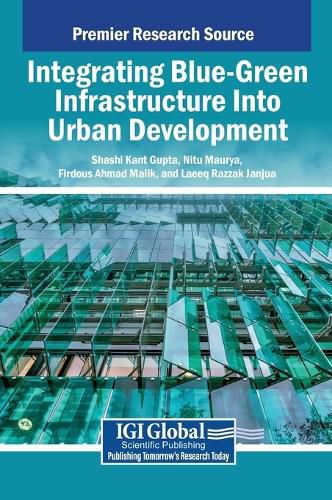Readings Newsletter
Become a Readings Member to make your shopping experience even easier.
Sign in or sign up for free!
You’re not far away from qualifying for FREE standard shipping within Australia
You’ve qualified for FREE standard shipping within Australia
The cart is loading…






This title is printed to order. This book may have been self-published. If so, we cannot guarantee the quality of the content. In the main most books will have gone through the editing process however some may not. We therefore suggest that you be aware of this before ordering this book. If in doubt check either the author or publisher’s details as we are unable to accept any returns unless they are faulty. Please contact us if you have any questions.
The necessity for innovative solutions is critical in the pursuit of a sustainable future, as the rapidly urbanizing world confronts climate change, biodiversity loss, and public health concerns. The concept of blue and green infrastructure is a game-changing innovation. Blue and green infrastructure provides a solution to urban planning by strategically incorporating natural and engineered aquatic features - blue infrastructure - with vegetation and green spaces - green infrastructure. This approach addresses environmental, social, and economic challenges, and improves water quality, reduces urban heat islands, and mitigates flood risks, enhancing urban resilience. It also fosters biodiversity by establishing habitats for a variety of species and establishing green spaces for human recreation and well-being. Further exploration may help establish blue-green infrastructure as a standard in urban development practices. Integrating Blue-Green Infrastructure Into Urban Development investigates the numerous opportunities that integrated infrastructure offers, including increased biodiversity, improved air and water quality, and enhanced climate resilience. It also addresses obstacles, such as stakeholder coordination, funding constraints, and equitable access to green and aquatic spaces. This book covers topics such as smart technology, energy engineering, and cybersecurity, and is a useful resource for architects, civil engineers, business owners, policymakers, environmentalists, scientists, researchers, and academicians.
$9.00 standard shipping within Australia
FREE standard shipping within Australia for orders over $100.00
Express & International shipping calculated at checkout
This title is printed to order. This book may have been self-published. If so, we cannot guarantee the quality of the content. In the main most books will have gone through the editing process however some may not. We therefore suggest that you be aware of this before ordering this book. If in doubt check either the author or publisher’s details as we are unable to accept any returns unless they are faulty. Please contact us if you have any questions.
The necessity for innovative solutions is critical in the pursuit of a sustainable future, as the rapidly urbanizing world confronts climate change, biodiversity loss, and public health concerns. The concept of blue and green infrastructure is a game-changing innovation. Blue and green infrastructure provides a solution to urban planning by strategically incorporating natural and engineered aquatic features - blue infrastructure - with vegetation and green spaces - green infrastructure. This approach addresses environmental, social, and economic challenges, and improves water quality, reduces urban heat islands, and mitigates flood risks, enhancing urban resilience. It also fosters biodiversity by establishing habitats for a variety of species and establishing green spaces for human recreation and well-being. Further exploration may help establish blue-green infrastructure as a standard in urban development practices. Integrating Blue-Green Infrastructure Into Urban Development investigates the numerous opportunities that integrated infrastructure offers, including increased biodiversity, improved air and water quality, and enhanced climate resilience. It also addresses obstacles, such as stakeholder coordination, funding constraints, and equitable access to green and aquatic spaces. This book covers topics such as smart technology, energy engineering, and cybersecurity, and is a useful resource for architects, civil engineers, business owners, policymakers, environmentalists, scientists, researchers, and academicians.